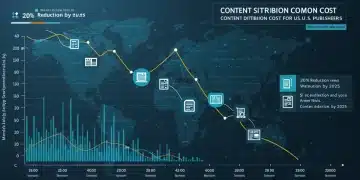Blockchain Revolution: Supply Chain Transparency by 2028

Blockchain technology, beyond its use in cryptocurrencies, is poised to revolutionize supply chain management by 2028, enhancing transparency, security, and efficiency through decentralized and immutable record-keeping.
The evolution of blockchain technology extends far beyond the realm of cryptocurrencies. By 2028, its transformative impact on supply chain transparency is expected to be profound. Blockchain Beyond Cryptocurrency: Exploring Its Impact on Supply Chain Transparency by 2028 promises to reshape how businesses operate, ensuring greater efficiency, security, and trust across the entire supply chain ecosystem.
The Dawn of Blockchain in Supply Chain Management
Blockchain technology is rapidly emerging as a pivotal tool in modern supply chain management. Its decentralized and immutable nature offers unprecedented advantages, enabling businesses to track products and materials from origin to consumer with enhanced visibility and security.
What is Blockchain?
At its core, blockchain is a distributed ledger technology (DLT) that records transactions across many computers. This creates a secure and transparent record that cannot be easily altered, making it ideal for supply chain applications.
Why Transparency Matters
Transparency in the supply chain is crucial for building trust with consumers, ensuring product authenticity, and complying with regulatory requirements. Blockchain provides a mechanism to verify the provenance and journey of goods, reducing the risk of fraud and counterfeiting.

Blockchain’s potential impact is further highlighted by its ability to:
- Reduce inefficiencies by automating processes and minimizing paperwork.
- Improve traceability, allowing businesses to quickly identify and address issues such as product recalls.
- Enhance security, protecting against tampering and fraud through cryptographic verification.
The integration of blockchain into supply chain operations represents a significant advancement, promising to create more resilient and trustworthy systems. As we move towards 2028, the adoption of blockchain will likely become a standard practice for companies aiming to gain a competitive edge.
Enhancing Traceability and Product Provenance
One of the most compelling applications of blockchain in supply chain management is its ability to enhance traceability and product provenance. This is especially critical in industries where authenticity and safety are paramount.
Verifying Product Origin
Blockchain allows companies to track the origin of raw materials and components, ensuring that products are sourced ethically and sustainably. This is particularly important in industries such as food and fashion, where consumers are increasingly concerned about the environmental and social impact of their purchases.
Tracking Movement and Ownership
With blockchain, every transaction in the supply chain, from manufacturing to distribution, is recorded on the ledger. This provides a complete and immutable record of the product’s journey, making it easy to verify its authenticity and prevent counterfeiting.
Key benefits of using blockchain for traceability include:
- Increased consumer trust, as customers can verify the provenance of products themselves.
- Reduced risk of fraud and counterfeiting, protecting businesses and consumers from financial losses.
- Improved compliance with regulatory requirements, ensuring that products meet safety and quality standards.
By 2028, blockchain-based traceability systems are expected to be commonplace, offering consumers unprecedented insights into the products they buy. This will drive demand for more transparent and accountable supply chains, pushing businesses to adopt blockchain technology to meet these expectations.
Streamlining Supply Chain Operations with Smart Contracts
Smart contracts are self-executing contracts written into the blockchain, which automatically enforce the terms of an agreement between buyers and suppliers. These contracts can significantly streamline supply chain operations, reducing costs and improving efficiency.
Automating Processes
Smart contracts can automate various processes in the supply chain, such as payment processing, inventory management, and quality control. This reduces the need for manual intervention, minimizing errors and delays.
Reducing Disputes
By clearly defining the terms of an agreement and automating enforcement, smart contracts can help reduce disputes between buyers and suppliers. This leads to smoother and more reliable supply chain operations.

The integration of smart contracts can lead to several operational benefits:
- Faster transaction times, as payments and other processes are executed automatically.
- Lower administrative costs, as less manual intervention is required.
- Improved transparency, as all parties have access to the same information.
As blockchain technology matures, the use of smart contracts in supply chain management is expected to grow significantly. By 2028, smart contracts will likely be an integral part of many supply chain operations, helping businesses to optimize their processes and improve their bottom line.
Addressing Challenges and Barriers to Adoption
Despite its many benefits, the adoption of blockchain in supply chain management faces several challenges and barriers. Overcoming these obstacles is essential for realizing the full potential of this technology.
Scalability Issues
One of the main challenges is scalability. Many blockchain networks struggle to handle the large volumes of transactions required in a global supply chain. This can lead to delays and increased costs.
Lack of Standardization
Another barrier is the lack of standardization. There are many different blockchain platforms and protocols, making it difficult for companies to integrate their systems. This can create compatibility issues and hinder interoperability.
Security Concerns
While blockchain is generally considered secure, there are still potential security risks. For example, smart contracts can be vulnerable to hacking if they are not properly written and audited.
To overcome these challenges, businesses need to:
- Invest in research and development to improve the scalability and security of blockchain networks.
- Work together to develop industry standards for blockchain applications in supply chain management.
- Implement robust security measures to protect against cyber threats and vulnerabilities.
By addressing these challenges, businesses can pave the way for widespread adoption of blockchain in supply chain management. As the technology matures and standards emerge, the barriers to adoption will gradually diminish.
The Role of Regulatory Frameworks and Compliance
Regulatory frameworks and compliance requirements play a crucial role in shaping the adoption of blockchain in supply chain management. Clear and consistent regulations can provide businesses with the certainty they need to invest in this technology.
Data Privacy and Security
One of the key regulatory considerations is data privacy and security. Blockchain systems must comply with regulations such as the General Data Protection Regulation (GDPR) and the California Consumer Privacy Act (CCPA), which protect consumers’ personal data.
Anti-Money Laundering (AML)
Blockchain can also be used to comply with anti-money laundering (AML) regulations by providing a transparent and auditable record of transactions. This can help prevent illicit activities such as money laundering and terrorist financing.
International Trade
Blockchain can streamline international trade by reducing paperwork, improving customs clearance, and facilitating cross-border payments. This can lead to faster and more efficient trade flows.
To ensure compliance, businesses should:
- Work closely with regulators to understand and comply with applicable laws and regulations.
- Implement robust data privacy and security measures to protect consumers’ personal data.
- Use blockchain to enhance transparency and traceability in their supply chains.
As regulatory frameworks evolve, businesses will need to adapt their blockchain strategies to remain compliant. This requires ongoing monitoring and engagement with regulators to ensure that blockchain technology is used responsibly and ethically.
Future Trends and Innovations in Blockchain-Enabled Supply Chains
Looking ahead, several key trends and innovations are expected to shape the future of blockchain-enabled supply chains. These developments will further enhance the efficiency, transparency, and security of supply chain operations.
Interoperability
One of the most important trends is interoperability, which refers to the ability of different blockchain networks to communicate and exchange data with each other. This will make it easier for companies to integrate their systems and collaborate across different supply chains.
Artificial Intelligence (AI)
The integration of AI with blockchain can further enhance supply chain efficiency by automating tasks such as demand forecasting, inventory management, and risk assessment. AI can also analyze blockchain data to identify patterns and trends that can improve decision-making.
Internet of Things (IoT)
The combination of IoT and blockchain can provide real-time visibility into the location and condition of goods as they move through the supply chain. This can help prevent theft, reduce spoilage, and improve delivery times.
Future innovations in blockchain-enabled supply chains may include:
- Decentralized autonomous organizations (DAOs) that automate supply chain management functions.
- Tokenization of assets, allowing businesses to easily track and trade ownership of goods.
- Advanced analytics tools that provide insights into supply chain performance and identify areas for improvement.
By embracing these trends and innovations, businesses can stay ahead of the curve and unlock the full potential of blockchain in supply chain management. As the technology continues to evolve, the opportunities for innovation will only continue to grow.
| Key Point | Brief Description |
|---|---|
| 🚀 Enhanced Transparency | Blockchain provides end-to-end visibility in the supply chain. |
| 🔒 Improved Security | Immutable records reduce fraud and counterfeiting risks. |
| ⏱️ Streamlined Operations | Smart contracts automate processes, cutting time and costs. |
| 🌐 Regulatory Compliance | Helps meet data privacy and anti-money laundering standards. |
Frequently Asked Questions
▼
Blockchain is a decentralized, distributed ledger technology that records transactions across many computers, creating a secure and transparent record that is difficult to alter.
▼
Blockchain provides a complete and immutable record of a product’s journey from origin to consumer, allowing stakeholders to verify authenticity and track movement at each stage.
▼
Smart contracts are self-executing agreements written into the blockchain that automate processes such as payment processing, inventory management, and quality control, reducing manual intervention.
▼
Key challenges include scalability issues, the lack of standardization across different blockchain platforms, and potential security concerns related to smart contract vulnerabilities.
▼
By 2028, blockchain is expected to be widely adopted, enhancing traceability, streamlining operations, and improving compliance, ultimately creating more resilient and trustworthy supply chain ecosystems.
Conclusion
In conclusion, the integration of blockchain technology into supply chain management extends far beyond its initial applications in cryptocurrency. By 2028, it promises to fundamentally reshape supply chain operations, enhancing transparency, trust, and efficiency. While challenges remain, the potential benefits are significant, paving the way for more resilient and accountable global trade.





